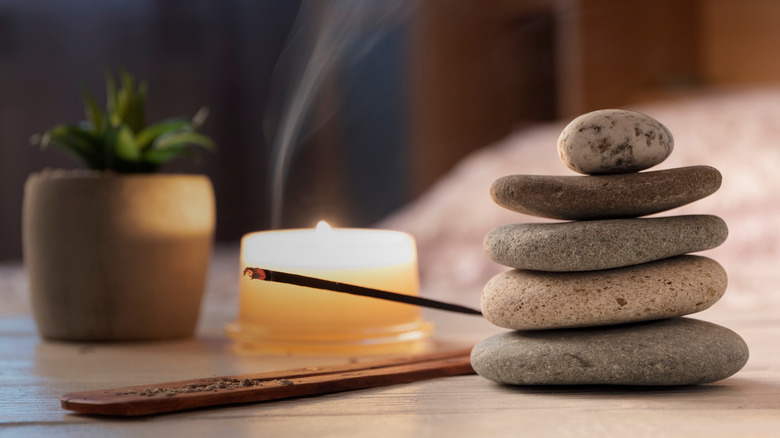The Hidden Dangers Of Burning Incense
Incense has been around for ages, dating all the way to ancient Egypt (via Britannica). While the types of incense we use today differ greatly from what was burned millennia ago, one constant remains: Incense generates smoke, and that can be dangerous (via Science Daily).
For starters, inhaling smoke, even in small amounts, is not healthy for your lungs. One study conducted in 2013 showed that smoke from burning incense causes lung inflammation (via ScienceDirect). Not only that, but the type of smoke emitted from certain types of incense contains pollutants such as carbon monoxide, sulfur dioxide, and formaldehyde.
Another study from 2008 found that a group of 61,320 women who burned incense regularly for five years had an increased chance of upper respiratory tract carcinomas (via US National Library of Medicine). The more they used incense, the greater their risk. Moreover, a 2011 study conducted on children found an association between incense smoke and asthma and asthma-like symptoms (via European Respiratory Journal).
Incense smoke affects more than the lungs
Incense smoke is not just unhealthy for your lungs. Other studies indicate that inhaling incense smoke does other damage to the body. Research shows breathing incense smoke causes inflammation in the body, and it can also damage DNA (via Springer Link). Another animal study also showed that smoke had a negative impact on metabolism, caused weight loss, and even lowered levels of good cholesterol (via Wiley Online Library). Furthermore, a 2014 study of over 60,000 people revealed higher incidences of cardiovascular-related deaths in those who burned incense (via US National Library of Medicine). More specifically, 12% of those who burned incense daily for at least 20 years were more likely to die from a form of heart disease.
There are healthier options when it comes to adding scents to your home. One is an oil burner, which is actually an oil warmer, in which you place a few drops of essential oil into the holder. You can also add a drops of essential oil to a small bowl of baking soda for an odor remover/air freshener (via Organic Authority).


